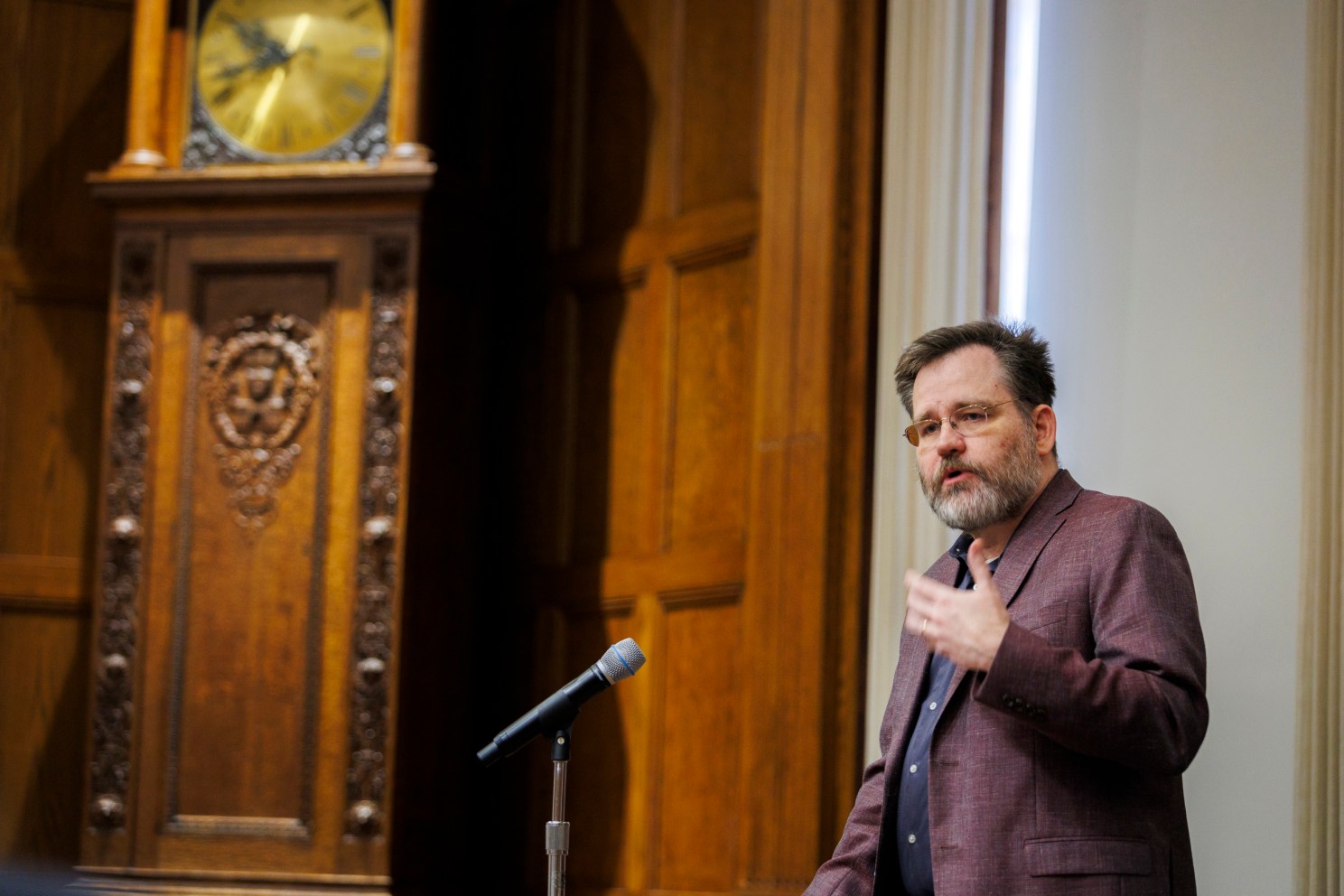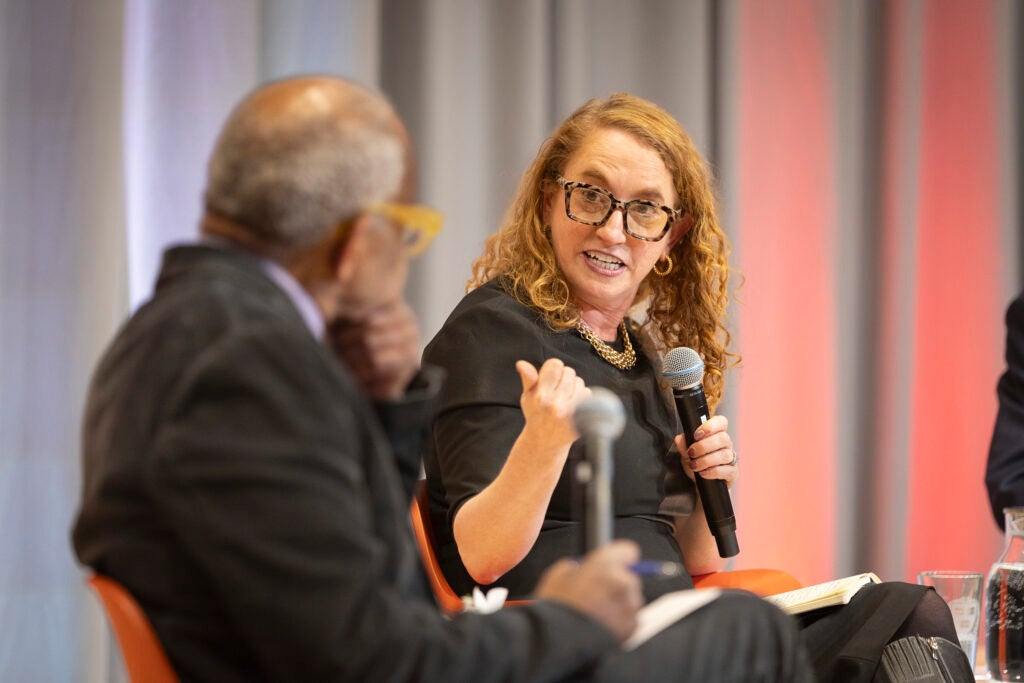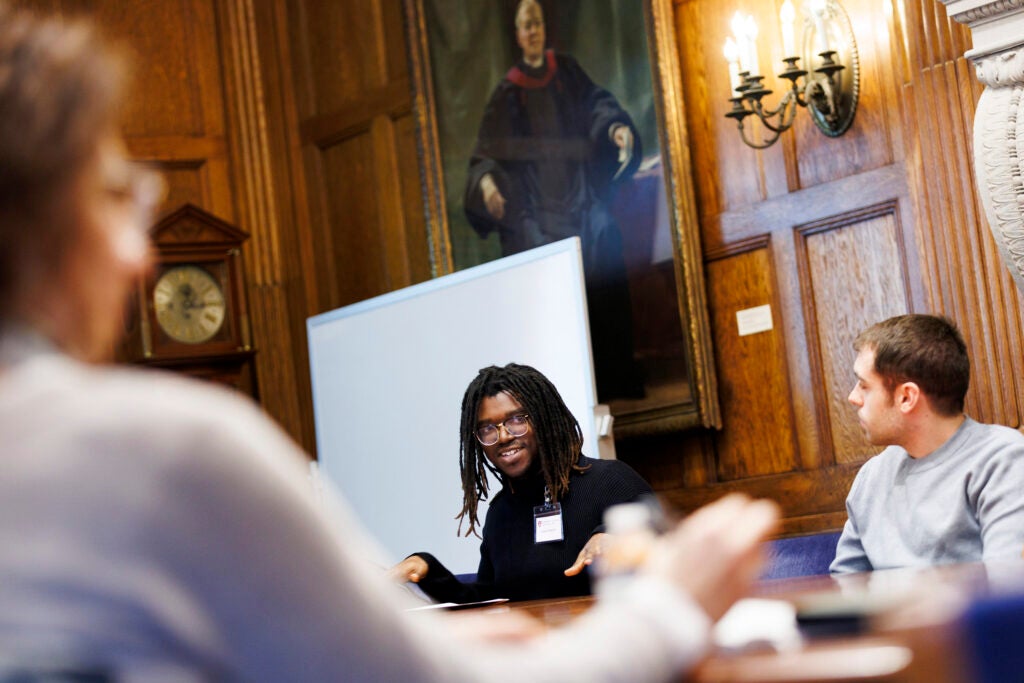Opening conversation on more, better discourse

Protecting academic freedom is central to the mission of colleges and universities to foster the discovery of knowledge, said keynote speaker Keith E. Whittington of Princeton University.
Stephanie Mitchell/Harvard Staff Photographer
Summit, hosted by College, PEN America, gathers speakers, workshops as part of Harvard Dialogues initiative
Harvard’s 2024 spring term kicks off with events across the University designed to enhance our ability to engage in respectful and robust debate.
The growing need for more and better discourse on difficult topics at Harvard as well as at college campuses across the nation prompted a two-day gathering last week co-hosted by the College and PEN America.
The Summit on Intellectual Vitality and Free Expression, which featured keynote speeches by scholars of law, history, and politics, and workshops for undergraduate students, kicked off Harvard Dialogues, a University-wide initiative to foster more open, productive communication in the classroom, on campus, and within the wider community.
The event launched Thursday night with Rakesh Khurana, Danoff Dean of Harvard College, moderating a panel discussion that included Suzanne Nossel ’91, J.D. ’96, chief executive at PEN America; Randall Kennedy, Michael R. Klein Professor at Harvard Law School; and John W. Boyer, senior adviser to the president and the Martin A. Ryerson Distinguished Service Professor at the University of Chicago.
Panelists debated censorship, disinformation, and the state of free speech on college campuses before taking questions from student participants.

“The University is an incubator for our pluralistic democracy and that democracy is being gravely challenged right now at a moment of unprecedented polarization,” said Suzanne Nossel.
Niles Singer/Harvard Staff Photographer
“Freedom of expression is absolutely essential if we’re talking about an educational institution,” Kennedy said. “How can you maintain a decent educational institution without people being able to express themselves freely? We learn to think through expressing ourselves, and it’s not just a matter of a speaker. There is the listener. Freedom of expression, thought about capaciously is freedom to read [and] freedom to listen. That’s absolutely central to the university. We have to be very attentive to it at all times, but particularly now.”
Nossel agreed.
“The University is an incubator for our pluralistic democracy and that democracy is being gravely challenged right now at a moment of unprecedented polarization,” she said.
That feeling of polarization was echoed by some students at the event. “I’ve spent a lot of time at Harvard thinking about the way in which social ramifications play out in regard to political discourse,” said Irati Egorho Diez ’25. Amid rising concerns overdiscourse on campus this academic year, Diez said she wanted to reconsider her views and potentially “figure out a new framework for thinking about these things.”
Students were given that opportunity on the summit’s second day, which kicked off with a keynote by Keith E. Whittington, the William Nelson Cromwell Professor of Politics at Princeton, on the evolution of academic freedom and the challenges students face to protect free speech on campuses throughout American history.
Whittington, who also serves as chair for the Academic Freedom Alliance and is a visiting fellow at the Hoover Institution at Stanford, noted that protecting academic freedom is central to the mission of colleges and universities to foster the discovery of knowledge. These protections allow faculty to “raise controversial ideas and have conversations with students about difficult and sensitive topics” and engage in and publish research that may be “too controversial, too offensive, [or] too disturbing,” Whittington said.
These issues were at the forefront for College senior Matthew Walsh when he decided to attend the summit.
Walsh said he returned to what he viewed as a “completely different” Harvard after spending a semester abroad in South Korea. “It’s been a little surprising to see that so much tension has come up so quickly, in just one semester,” he said. “It’s been a rude awakening for a lot of different things that have happened. I’m thankful for this summit on our campus to show that we can have tough discourse about difficult issues.”
Walsh said in the past he felt hesitant to share his Christian values and beliefs. He hoped the summit would teach him the importance of speaking up. He attended a workshop on academic freedom led by PEN America’s Kristen Shahverdian following the morning’s keynote address.

Jamaal Baptiste (left) and Matthew Walsh ’24 participate in the academic freedom workshop.
Stephanie Mitchell/Harvard Staff Photographer
“I was really interested in seeing the discussions that we’re going to have in the workshop about that and how the University is sort of a unique place to share different ideas and views, and to have a discourse on those views to make us better students, peers, and people,” Walsh said.
Shahverdian’s workshop — one of three offered and led by PEN America facilitators — allowed students, faculty, and staff to consider ways that universities can protect free speech and academic freedom. Students called for spaces to actively create and allow dialogue, improved processes to appeal grades, and clear policies for the norms of discussions.
Many Harvard students attended the summit, but the event also drew a number from other institutions.
Sabik Jawad, a sophomore from Dartmouth College, was galvanized to attend after his university’s response to student protests last fall calling for it to adopt a series of progressive policies dubbed the “Dartmouth New Deal.” Jawad said the October arrest of two student protesters who were New Deal supporters was a “call to action” to learn how to promote freedom of speech and academic freedom on college campuses.
Bowdoin College senior Alondra Romero hoped the event would help her discover new ways to foster inclusive dialogue. A fellow at Bowdoin’s McKeen Center for the Common Good, Romero was interested in learning about free speech in an academic setting and considering how the internet allows for the amplification of ideas as well as the promotion of cancel culture.
“It’s been really interesting for me as a student to zoom out and look at what academic expression feels like as a professor and what rights there are at a private institution versus a public one. I didn’t really know all of that and was very stuck on the student perspective,” she said.
“There’s not enough good modeling of the kinds of behaviors and mutuality, reciprocity, and grace that we give each other when we try to understand and get behind somebody’s eyes to hear from their perspective,” said Khurana in his closing remarks. “I hope you don’t just see yourselves as just having gone through a program, but as ambassadors and as part of a community of interpreters and debaters.”




